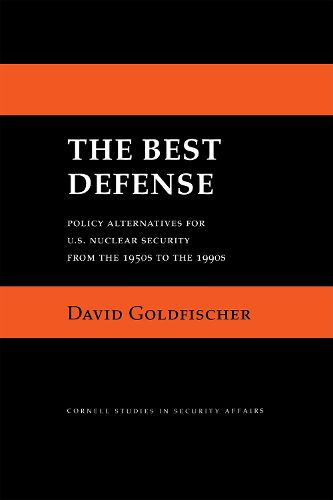Readings Newsletter
Become a Readings Member to make your shopping experience even easier.
Sign in or sign up for free!
You’re not far away from qualifying for FREE standard shipping within Australia
You’ve qualified for FREE standard shipping within Australia
The cart is loading…






The Best Defense considers fundamental questions regarding the United States and the Soviet Union acquiring capabilities to destroy each other in a nuclear war. Was it inevitable? Or could they have agreed instead to address the nuclear danger through mutual emphasis on defenses? Might such an approach be a feasible option for nuclear powers in today's world?
David Goldfischer looks at how figures including J. Robert Oppenheimer, Donald G. Brennan, Freeman Dyson, and Jonathan Schell advanced compelling arguments for seeking an arms control agreement favoring defenses against nuclear attack. First developed by Oppenheimer as an alternative to a dangerous reliance on strategic bombing and again proposed in the 1960s as preferable to basing arms control on "mutual assured destruction," mutual defense emphasis was briefly adopted as a US arms control proposal when the cold war waned in the mid-1980s.
The Best Defense offers provocative explanations for why this approach was rejected and argues that the compelling need to protect populations makes mutual defense emphasis the most promising basis for an enduring nuclear arms control and disarmament regime.
$9.00 standard shipping within Australia
FREE standard shipping within Australia for orders over $100.00
Express & International shipping calculated at checkout
The Best Defense considers fundamental questions regarding the United States and the Soviet Union acquiring capabilities to destroy each other in a nuclear war. Was it inevitable? Or could they have agreed instead to address the nuclear danger through mutual emphasis on defenses? Might such an approach be a feasible option for nuclear powers in today's world?
David Goldfischer looks at how figures including J. Robert Oppenheimer, Donald G. Brennan, Freeman Dyson, and Jonathan Schell advanced compelling arguments for seeking an arms control agreement favoring defenses against nuclear attack. First developed by Oppenheimer as an alternative to a dangerous reliance on strategic bombing and again proposed in the 1960s as preferable to basing arms control on "mutual assured destruction," mutual defense emphasis was briefly adopted as a US arms control proposal when the cold war waned in the mid-1980s.
The Best Defense offers provocative explanations for why this approach was rejected and argues that the compelling need to protect populations makes mutual defense emphasis the most promising basis for an enduring nuclear arms control and disarmament regime.